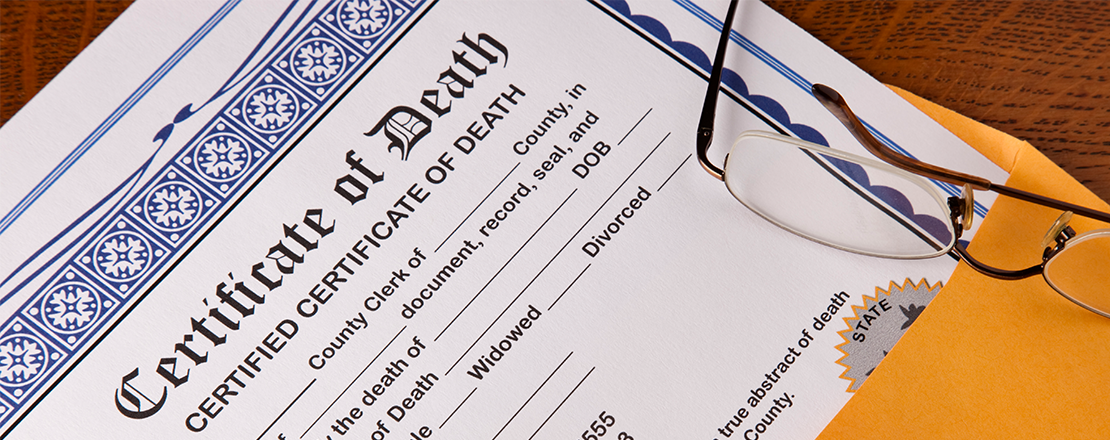A Family's Guide to Death Certificates

When a loved one passes away, there will be many decisions to make and paperwork to handle during this time of grieving. One of the most important documents a family will need is the death certificate. Understanding death certificates can save time and undue stress when the time comes.
What is a death certificate?
A death certificate is a legal document that includes the record of the fact of death and personal information about the deceased.
What are death certificates used for?
Death certificates are used to arrange end-of-life legal affairs, such as closing financial accounts or accessing insurance benefits. They also provide closure and peace of mind to the family. Public health officials also use them to inform health statistics, study population-based mortality, and influence public health policy.
Where do I obtain a death certificate?
The final death certificate is available from the state or local vital records/register of deeds’ office or can often be obtained by the family through the funeral home that took care of the deceased’s final disposition. The State where the deceased was declared dead may have restrictions on who can obtain the death certificate.
While settling final affairs, the family will need multiple death certificates. It is recommended to first figure out which organizations and accounts require original death certificates, and which accept photocopies. This will determine how many original certified copies are needed.
What information is included on a death certificate?
The death certificate contains critical personal information about the deceased and the cause and manner of their death, based on the best medical judgment of the certifier. Certifiers are expected to use their training, knowledge, available medical history, symptoms, diagnostic tests, and autopsy results, if available, to determine the cause of death.
What is a "pending" death certificate?
A pending death certificate is considered a legal document and can be used to legally verify death and some of the personal information about the deceased. A death certificate can be registered and certified with the cause or manner of death listed as pending further study, investigation, or autopsy. Once additional information is known, such as investigative or autopsy results, the certifier will update the death certificate.
Who completes the death certificate?
A pending death certificate is considered a legal document and can be used to legally verify death and some of the personal information about the deceased. A death certificate can be registered and certified with the cause or manner of death listed as pending further study, investigation, or autopsy. Once additional information is known, such as investigative or autopsy results, the certifier will update the death certificate.
If an autopsy is not otherwise available, families can inquire about autopsy services from pathologists who offer fee-for-service autopsies.
How can I learn more?
Since each state may have unique statutes regarding death certificates, the vital records/register of deeds’ office in the state or local area where the deceased was declared dead is a reliable resource. Families can often also reach out to the funeral home. The medical certifier listed on the death certificate or the institution where the deceased died can also often answer questions about the cause of death.
This article was written by Michelle Aurelius, MD, FCAP. Dr. Aurelius completed her anatomic and clinical pathology residency at The University of Iowa Hospitals and Clinics, and her forensic pathology fellowship at the New Mexico Office of the Medical Investigator at the University of New Mexico School of Medicine. Her previous roles in state-wide medical examiner systems have included Hospital Autopsy Director, Interim Chief Toxicologist, Deputy Chief Medical Examiner, and Assistant Chief Medical Investigator. She is currently the Chief Medical Examiner at the North Carolina Office of the Chief Medical Examiner in Raleigh, NC.